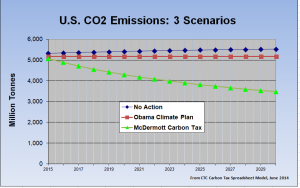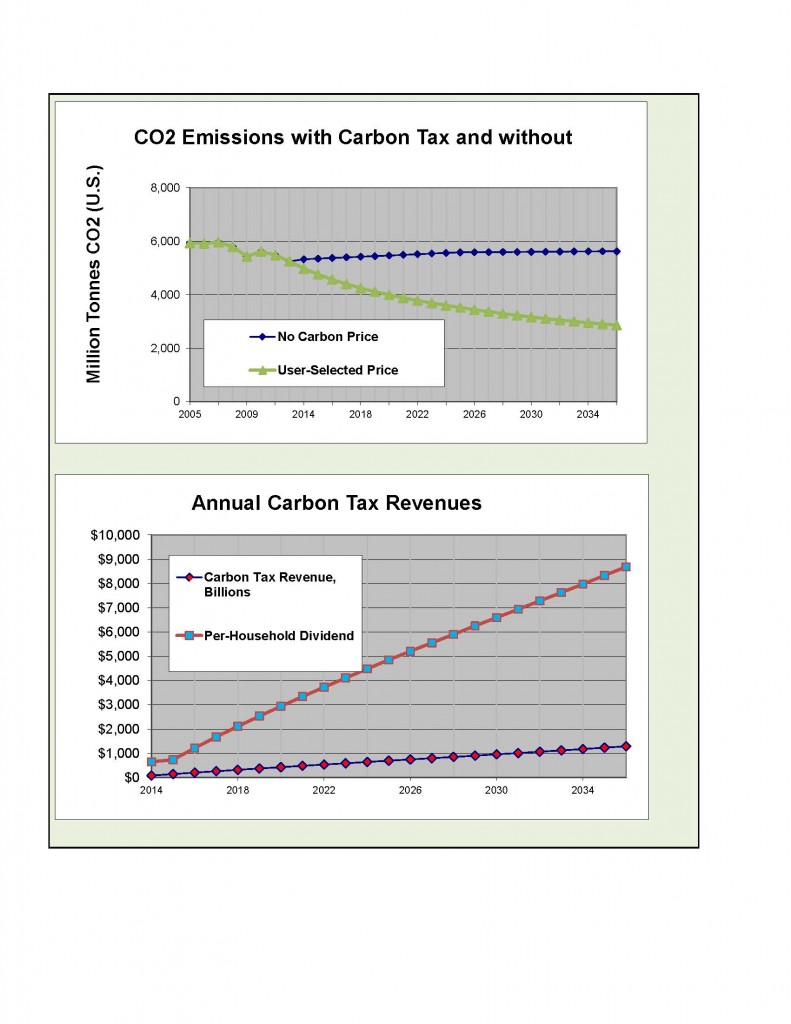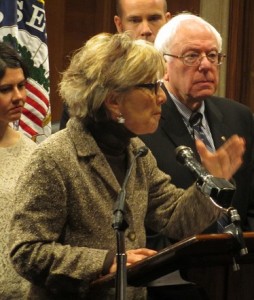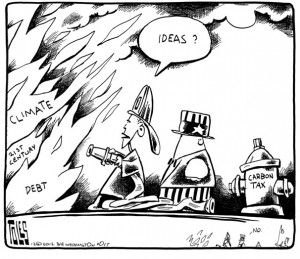This page, featuring authors, writers and “pundits” (newspaper and magazine columnists, principally), is one of half-a-dozen compiling expressions of support for carbon taxes (or more targeted taxes, e.g., on gasoline) by notable individuals and organizations. To access other pages with different supporter categories, click on the Progress link on the navigation bar and move to the desired category.
New York Times columnists
Many of the Times’ regular editorial columnists have supported a carbon tax. See Writers & Pundits section of our Archived Supporters page for pro-carbon tax expressions by former Times columnists.
David Brooks
“Raise taxes on carbon emissions,” urged The Times’ most right-leaning columnist, on Nov. 30, 2006 (Waiting To Be Wooed). Although Brooks favored using the tax revenues to make tax cuts on dividends and capital gains permanent, a stance at odds with CTC’s progressive-tax-shift position, he at least grasped the need to reflect climate-change costs in fuel prices.
In 2009, Brooks wrote:
A crusade for economic self-restraint would have to rearrange the current alliances and embrace policies like energy taxes and spending cuts that are now deemed politically impossible. But this sort of moral revival is what the country actually needs.(The Next Culture War, Sept. 29, 2009, emphasis added).
In a commentary on the 2012 State of the Union address, Brooks chided President Obama for ignoring the Peterson Foundation’s call to “tax fossil fuels to spur innovation,” among other recommendations. (Hope, But Not Much Change, Jan. 27, 2012).
In a critique of clean-tech subsidies during the 2012 presidential campaign, Brooks wrote:
Global warming is still real. Green technology is still important. Personally, I’d support a carbon tax to give it a boost. But he who lives by the subsidy dies by the subsidy. Government planners should not be betting on what technologies will develop fastest. They should certainly not be betting on individual companies.(A Sad Green Story, Oct. 18, 2012, emphasis added.)
Paul Krugman
The Times influential economist-columnist (and economics Nobel laureate) has, curiously, shied from carbon-tax advocacy. During the run-up to the Dec. 2009 Copenhagen COP-15 session, Krugman attacked climatologist and cap-and-trade opponent James Hansen for allegedly failing to grasp that a robust permit-based emissions-control system would lead to the rising carbon price Hansen advocated. (Krugman badly underestimated Hansen’s economics acumen, in our view, as can be seen by reading any of Hansen’s pronouncements gathered on the Scientists page of this Web site or by viewing Hansen’s presentation at the Nov. 2010 Wesleyan Univ. Pricing Carbon conference.) Nevertheless, in a July, 2011 post on his Conscience of a Liberal blog, Krugman came out swinging for putting a price on carbon emissions:
Opponents of a strong policy to curb greenhouse gases tend to be fervent believers in the magic of market economies. Yet somehow their faith goes away when it comes to environmental issues. If you seriously believe in markets, you should believe that given the right incentives — namely, putting a price on emissions, through either a tax or a tradable permit scheme — the economy will find lots of ways to emit less. You should definitely not believe, as anti-environmentalists claim, that the result would be economic disaster. (The Answer, My Friend, July 19, 2011)
Thomas Friedman
His has been the most influential and persistent journalistic voice for breaking U.S. oil dependence by taxing gasoline and for addressing climate change with a carbon tax. His most recent column, The Market and Mother Nature, on Jan. 9, 2013, placed a carbon tax in the politically viable context of fiscal and tax reform:
A carbon tax would reinforce and make both strategies [deficit reduction and climate stabilization] easier. According to a September 2012 study by the Congressional Research Service, a small carbon tax of $20 per ton — escalating by 5.6 percent annually — could cut the projected 10-year deficit by roughly 50 percent (from $2.3 trillion down to $1.1 trillion).
Although a carbon tax needs to grow far faster than CRS’s hypothetical tax — which would take 13 years to double to just $40/ton — Friedman at least shows no signs of backing off his long-time carbon tax advocacy.
Friedman’s Sept. 14, 2011 column in this vein, Is It Weird Enough Yet?, was classic. Friedman set the table:
[H]ere is the Texas governor rejecting the science of climate change while his own state is on fire — after the worst droughts on record have propelled wildfires to devour an area the size of Connecticut. As a statement by the Texas Forest Service said last week: “No one on the face of this earth has ever fought fires in these extreme conditions.”
He continued:
There is only one effective, sustainable way to produce “green jobs,” and that is with a fixed, durable, long-term price signal that raises the price of dirty fuels and thereby creates sustained consumer demand for, and sustained private sector investment in, renewables. Without a carbon tax or gasoline tax or cap-and-trade system that makes renewable energies competitive with dirty fuels, while they achieve scale and move down the cost curve, green jobs will remain a hobby.
and:
We need revenue to balance the budget. We need sustainable clean-tech jobs. We need less dependence on Mideast oil. And we need to take steps to mitigate climate change — just in case Governor Perry is wrong. The easiest way to do all of this at once is with a gasoline tax or price on carbon. Would you rather cut Social Security and Medicare or pay a little more per gallon of gas and make the country stronger, safer and healthier? It still amazes me that our politicians have the courage to send our citizens to war but not to ask the public that question.
Similarly, but more succinctly, is this passage from Friedman’s Nov. 28, 2010 column, Got to Get This Right:
We need to raise gasoline and carbon taxes to discourage their use and drive the creation of a new clean energy industry, while we cut payroll and corporate taxes to encourage employment and domestic investment.
The same sentiments appeared most recently on Aug. 5, 2012, under virtually the same headline, Get It Right On Gas:
[W]e also need to get the economics right. We’ll need more tax revenue to reach a budget deal in January. Why not a carbon tax that raises enough money to help pay down the deficit and lower both personal income taxes and corporate taxes — and ensures that renewables remain competitive with natural gas?
Friedman was both more expansive and more eloquent in The Price Is Not Right (April 1, 2009):
[I]f I had my wish, the leaders of the world’s 20 top economies would commit themselves to a new standard of accounting — call it “Market to Mother Nature” accounting. Why? Because it’s now obvious that the reason we’re experiencing a simultaneous meltdown in the financial system and the climate system is because we have been mispricing risk in both arenas — producing a huge excess of both toxic assets and toxic air that now threatens the stability of the whole planet.
Just as A.I.G. sold insurance derivatives at prices that did not reflect the real costs and the real risks of massive defaults (for which we the taxpayers ended up paying the difference), oil companies, coal companies and electric utilities today are selling energy products at prices that do not reflect the real costs to the environment and real risks of disruptive climate change (so future taxpayers will end up paying the difference).
Whenever products are mispriced and do not reflect the real costs and risks associated with their usage, people go to excess. And that is exactly what happened in the financial marketplace and in the energy/environmental marketplace during the credit bubble.
And our biggest energy companies, utilities and auto companies became dependent on cheap hydrocarbons that spin off climate-changing greenhouse gases, and we clearly have not forced them, through a carbon tax, to price in the true risks and costs to society from these climate-changing fuels.
“Destructive creation” has wounded both the Market and Mother Nature. Smart regulation and carbon taxation can heal both.
One week later, in Show Us the Ball (April 8, 2009), Friedman singled out Rep. John Larson’s carbon tax bill, “America’s Energy Security Trust Fund and Security Act, for praise:
Since the opponents of cap-and-trade are going to pillory it as a tax anyway, why not go for the real thing — a simple, transparent, economy-wide carbon tax?
Representative John B. Larson, chairman of the House Democratic Caucus, has circulated a draft bill that would impose “a per-unit tax on the carbon-dioxide content of fossil fuels, beginning at a rate of $15 per metric ton of CO2 and increasing by $10 each year.” The bill sets a goal, rather than a cap, on emissions at 80 percent below 2005 levels by 2050, and if the goal for the first five years is not met, the tax automatically increases by an additional $5 per metric ton. The bill implements a fee on carbon-intensive imports, as well, to press China to follow suit. Larson would use most of the income to reduce people’s payroll taxes: We tax your carbon sins and un-tax your payroll wins.
People get that — and simplicity matters. Americans will be willing to pay a tax for their children to be less threatened, breathe cleaner air and live in a more sustainable world with a stronger America. They are much less likely to support a firm in London trading offsets from an electric bill in Boston with a derivatives firm in New York in order to help fund an aluminum smelter in Beijing, which is what cap-and-trade is all about. People won’t support what they can’t explain.
We also count a dozen columns urging gasoline and/or carbon taxation in 2006 alone, including Who’s Afraid of a Gas Tax? (“Americans not only know that our oil addiction is really bad for us, but they would be willing to accept a gasoline tax if some leader would just frame the stakes for the country the right way,” March 1, 2006). Friedman subsequently broadened his call to “a gasoline or carbon tax”: And The Color of the Year Is … (“You have to make sure that green energy sources … can be delivered as cheaply as oil, gas and dirty coal. That will require a gasoline or carbon tax to keep the price of fossil fuels up so investors in green-tech will not get undercut while they drive innovation forward and prices down,” Dec. 22, 2006).
Friedman kept the pressure on in 2007, with The First Energy President (“It means asking Americans to do some hard things [including] accepting a gasoline or carbon tax,” Jan. 5), and (A Warning From the Garden, Jan. 19):
I don’t care whether it is a federal gasoline tax, carbon tax, B.T.U. tax or cap-and-trade system, power utilities, factories and car owners have to be required to pay the real and full cost to society of the carbon they put into the atmosphere. And higher costs for fossil fuels make more costly clean alternatives more competitive… And prices matter. They drive more and cleaner energy choices. So when the president unveils his energy proposals, if they don’t call for higher efficiency standards and higher prices for fossil fuels — take your socks off yourself. It’s going to get hot around here.
In a 9,000-word cover story in the Times Sunday Magazine in 2007, Friedman stated his preference for a carbon tax over a cap-and-trade system:
The market alone won’t work. Government’s job is to set high standards, let the market reach them and then raise the standards more. That’s how you get scale innovation at the China price. Government can do this by imposing steadily rising efficiency standards for buildings and appliances and by stipulating that utilities generate a certain amount of electricity from renewables — like wind or solar. Or it can impose steadily rising mileage standards for cars or a steadily tightening cap-and-trade system for the amount of CO2 any factory or power plant can emit. Or it can offer loan guarantees and fast-track licensing for anyone who wants to build a nuclear plant. Or — my preference and the simplest option — it can impose a carbon tax that will stimulate the market to move away from fuels that emit high levels of CO2 and invest in those that don’t. Ideally, it will do all of these things. But whichever options we choose, they will only work if they are transparent, simple and long-term — with zero fudging allowed and with regulatory oversight and stiff financial penalties for violators. The Power of Green, April 15, 2007
Friedman reiterated his desire for a carbon tax later in 2007, while criticizing the carbon offsets fad:
[W]hen you suggest a carbon tax or a higher gasoline tax — initiatives that would redirect resources and change habits at the scale actually needed to impact global warming — what is the first thing you hear in Congress? “Impossible — you can’t use the T-word.” A revolution without sacrifice where everyone is a winner? There’s no such thing. Live Bad, Go Green, July 8, 2007.
On May 21, 2008, Friedman opined:
It baffles me that President Bush would rather go to Saudi Arabia twice in four months and beg the Saudi king for an oil price break than ask the American people to drive 55 miles an hour, buy more fuel-efficient cars or accept a carbon tax or gasoline tax that might actually help free us from what he called our “addiction to oil.” Imbalances of Power.
Eight days later, on May 29, 2008, Friedman argued for a “price floor” to “guarantee people a high-price of gasoline – forever.” As Friedman stated:
The message going forward to every car buyer and carmaker would be this: The price of gasoline is never going back down. Therefore, if you buy a big gas guzzler today, you are locking yourself into perpetually high gasoline bills. You are buying a pig that will eat you out of house and home. At the same time, if you, a manufacturer, continue building fleets of nonhybrid gas guzzlers, you are condemning yourself, your employees and shareholders to oblivion. Truth or Consequences.
Friedman’s Dec. 7, 2008 column, The Real Generation X, contained possibly his most full-throated call yet for a carbon tax (emphases added):
It makes no sense to spend money on green infrastructure — or a bailout of Detroit aimed at stimulating production of more fuel-efficient cars — if it is not combined with a tax on carbon that would actually change consumer buying behavior.
Many people will tell Mr. Obama that taxing carbon or gasoline now is a “nonstarter.” Wrong. It is the only starter. It is the game-changer. If you want to know where postponing it has gotten us, visit Detroit. No carbon tax or increased gasoline tax meant that every time the price of gasoline went down to $1 or $2 a gallon, consumers went back to buying gas guzzlers. And Detroit just fed their addictions — so it never committed to a real energy-efficiency retooling of its fleet. R.I.P.
If Mr. Obama is going to oversee a successful infrastructure stimulus, then it has to include not only a tax on carbon — make it revenue-neutral and rebate it all by reducing payroll taxes — but also new standards that gradually require utilities and home builders in states that receive money to build dramatically more energy-efficient power plants, commercial buildings and homes. This, too, would create whole new industries.
Friedman followed that up on Dec. 28 with Win, Win, Win, Win, Win …:
I believe the second biggest decision Barack Obama has to make — the first is deciding the size of the stimulus — is whether to increase the federal gasoline tax or impose an economy-wide carbon tax. Best I can tell, the Obama team has no intention of doing either at this time… But I’ve wracked my brain trying to think of ways to retool America around clean-power technologies without a price signal — i.e., a tax — and there are no effective ones. (Toughening energy-effiency regulations alone won’t do it.) Without a higher gas tax or carbon tax, Obama will lack the leverage to drive critical pieces of his foreign and domestic agendas… The two most important rules about energy innovation are: 1) Price matters — when prices go up people change their habits. 2) You need a systemic approach.
Nicholas Kristof
His Hurricane Sandy cri de coeur, Will Climate Get Some Respect Now?, brilliantly connects the storm’s destructive ferocity to climate change, citing a warmer ocean, rising seas, more moist atmosphere, and the possibility that melting sea ice in the Arctic abetted the unusual atmospheric pattern that kept Sandy from moving back out to sea. His column concluded:
[W]e may need to invest in cleaner energy, impose a carbon tax or other curbs on greenhouse gases, and, above all, rethink how we can reduce the toll of a changing climate. (Oct. 31, 2012)
Here’s a Kristof sampler from prior years: Extended Forecast: Bloodshed (April 12, 2008):
[T]he United States’ reluctance to confront climate change in a serious way — like a carbon tax to replace the payroll tax, coupled with global leadership on the issue – [is] as unjust as it is unfortunate.” In Search of Cheney’s ‘Virtue’ (“The best way to encourage [widespread implementation of energy efficiency] would be to impose a carbon tax, although a cap-and-trade system is a reasonable backup.” Aug. 20, 2007). Our Gas Guzzlers, Their Lives (“All this [climate-exacerbated drought and famine in Africa] makes it utterly reckless that we fail to institute a carbon tax or at least a cap-and-trade system for emissions.” June 28, 2007). Scandal Below the Surface (“We know what is needed: a carbon tax or cap-and-trade system, a post-Kyoto accord on emissions cutbacks, and major research on alternative energy sources,” Oct. 31, 2006). A Paradise Drowning (“We must encourage conservation and fuel efficiency, support alternative forms of energy like wind, solar and biofuels, and … adopt a carbon tax… Jan. 8, 2006).
Gail Collins
When op-ed columnist Collins turned her attention to climate change, in early 2013, she zipped off some impressive lines:
There was a time … when the Republican Party was a hotbed of environmental worrywarts. The last big clean air act of the Bush I administration passed the House 401 to 21. But no more, no more. You’re not going to get any sympathy for controlling climate change from a group that doesn’t believe the climate is actually changing … It’s sort of ironic. These are the same folks who constantly seed their antideficit speeches with references to our poor, betrayed descendants. (“This is a burden our children and grandchildren will have to bear.”) Don’t you think the children and grandchildren would appreciate being allowed to hang onto the Arctic ice cap?
Collins acknowledged the Obama administration’s tightening of auto and appliance efficiency standards and then got down to business:
But a carbon tax/fee is the key to controlling climate change. That or just letting the next generation worry about whether the Jersey Shore is going to wind up lapping Trenton. (Cooling on Warming, March 27, 2013)
NYT Economic Columnist David Leonhardt (“Economix”)
The simplest idea in economics, I think, is that people respond to the incentives they are given… So if we have decided that we need to use less oil for our own good — which seems to be the case — we need big incentives to change our behavior… A substantial gas tax would be the simplest, with other taxes being cut to keep down the overall burden. Buy A Hybrid, Save A Guzzler, Feb. 8, 2006.
[I]f you put the economic advisers, from both parties, in a room and told them to hammer out solutions to the country’s big economic problems, they would find a lot of common ground. They could agree that doctors and patients need better incentives to choose effective medical care. They would probably hit upon education policies along similar lines, requiring that schools be held more accountable for what their students are, and are not, learning. They might suggest a carbon tax — a favorite idea of [former Bush chief economist Greg] Mankiw — to deal with global warming. The Economists are Writing Our Future, April 18, 2007.
No wonder [with gas now at $4 a gallon] that Americans are changing their driving habits so quickly. With sales plummeting, General Motors said Tuesday that it would stop making pickup trucks and sport utility vehicles at four of its North American plants. The company is also considering selling its Hummer brand, an emblem of the megavehicle. Rick Wagoner, G.M.’s chairman, explained the moves by saying that he thought the shift toward more efficient cars was ‘by and large, permanent.’ The unyielding reality is that price matters, enormously. That’s all you need to know about the car market these days. Big Vehicles Stagger Under the Weight of $4 Gas, June 4, 2008.
Steven Rattner
NYT Contributing Opinion Writer Rattner made a classic (and, in 2021, somewhat antequated) case for President Biden to “lean more heavily on the private sector to boost his infrastructure plan’s odds of success,” in Biden’s Big Government Should Be Handled With Care, April 9, 2021. It’s unclear if centrists like WV Sen. Joe Manchin or a handful of reputedly climate-concerned Republican Senators like Romney (UT), Murkowski (AS) or Collins (ME) are listening:
It’s criminal that the 18.4-cent federal gasoline tax hasn’t been raised since 1993, especially with oil prices so low. A tax of $43 per ton on carbon would be roughly equivalent to a 38-cents-per-gallon increase in the price of gasoline, leading motorists to cut back on their driving and opt for public transportation. And the proceeds could be rebated to Americans other than the wealthy via income tax credits.
The simplest, most effective and ultimately least expensive way to address the climate problem would be through a tax on greenhouse gas emissions — a carbon tax. Think about how many inefficient programs, how many thousands of pages of regulations and how much waste could be avoided.
Other Newspapers
See the Writers & Pundits section of our Archived Supporters page for older pro-carbon tax commentary by Washington Post columnists E.J. Dionne, Anne Applebaum and others; Financial Times columnist Clive Crook, San Francisco Chronicle columnist Carolyn Lochhead; and others.
Magazines
See the Writers & Pundits section of our Archived Supporters page for older pro-carbon tax commentary in The New Republic, Atlantic Monthly, The Nation, and other periodicals.
Elizabeth Kolbert, The New Yorker magazine, author, “The Sixth Extinction”
In her article “Rough Forecasts,” (April 14, 2014) Elizabeth Kolbert used the global ban on CFCs to foreground her argument that it is time to stop “standing around and waiting” when dealing with climate change. Specifically, Kolbert argued for a carbon tax and explained:
Economists on both sides of the political spectrum agree that the most efficient way to reduce emissions is to impose a carbon tax. “If you want less of something, every economist will tell you to do the same thing: make it more expensive,” former Mayor Michael Bloomberg observed, in a speech announcing his support for such a tax.
Kolbert’s call for a carbon tax is particularly salient in the last paragraph of her article:
The fact that so much time has been wasted standing around means that the problem of climate change is now much more difficult to deal with than it was when it was first identified. But this only makes the imperative to act that much greater, because, as one set of grim predictions is being borne out, another, even worse set remains to be written.
In an earlier article, “Paying For It,” (December 10, 2012) published in the aftermath of Hurricane Sandy, Kolbert forcefully made the case for a carbon tax both as a way to create the incentives needed to reduce carbon pollution and as a substantial source of revenue, preferable to other kinds of taxes. She explained how the “polluter pays” principle applies to carbon taxes:
One way to think about global warming is as a vast, planet-wide Pigovian problem. In this case, the man pulls up to a gas pump. He sticks his BP or Sunoco card into the slot, fills up, and drives off. He’s got a full tank; the gas station and the oil company share in the profits. Meanwhile, the carbon that spills out of his tailpipe lingers in the atmosphere, trapping heat and contributing to higher sea levels. As the oceans rise, coastal roads erode, beachfront homes wash away, and, finally, major cities flood. Once again, it’s the public at large that gets left with the bill. The logical, which is to say the fair, way to address this situation would be to make the driver absorb the cost for his slice of the damage. This could be achieved by a new Pigovian tax, on carbon.
“Pigovian” refers to the legendary British economist Alfred Pigou who early in the 20th Century pioneered the study of “externalities,” with environmental pollution as his prime case.
Noting that “as Washington edges toward the fiscal cliff, it has become obvious to just about everyone, except maybe House Republicans, that Washington needs more revenue,” Kolbert pointed out recent research showing the fiscal benefits of carbon taxes:
The Congressional Research Service reported that, over the next decade, a relatively modest carbon tax could cut the projected federal deficit in half. Such a tax would be imposed not just on gasoline but on all fossil fuels—from the coal used to generate electricity to the diesel used to run tractors—so it would affect the price of nearly everything, including food and manufactured goods. To counter its regressive effects, the tax could be used as a substitute for other, even more regressive taxes, or, alternatively, some of the proceeds could be returned to low-income families as rebates (although, of course, this would cut down on the amount that could go toward deficit reduction).
But she lamented:
One key player who has not embraced the idea is Barack Obama. The White House spokesman, Jay Carney, was asked about the tax last month, en route, as it happens, to visit storm-ravaged areas of New York with the President. “We would never propose a carbon tax, and have no intention of proposing one,” Carney told reporters. This was taken by some to mean that Obama was opposed to the tax and by others to mean just that he was not going to be the one to suggest it. In either case, the White House is making a big mistake. Pigovian taxes are rarely politically popular—something they have in common with virtually all taxes. But, as Obama embarks on his second term, it’s time for him to take some risks. Several countries, including Australia and Sweden, already have a carbon tax. Were the United States to impose one, it would have global significance. It would show that Americans are ready to acknowledge, finally, that we are part of the problem. There is a price to be paid for living as we do, and everyone is going to get stuck with the bill.
Kolbert’s suggestion partially came true at the end of 2015, at the Paris climate conference, when President Obama took the “risk” (albeit in the latter part of his second term) and affirmed that he has “long believed that the most elegant way to drive innovation and to reduce carbon emissions is to put a price on it … This is a classic market failure.” (Obama’s quote may be found at the end of the linked post.)
Others
See the Writers & Pundits section of our Archived Supporters page for older pro-carbon tax commentary by The New Yorker columnist Hendrik Hertzberg, columnist Fareed Zakaria, Newsweek columnist Robert J. Samuelson, 350.org founder and journalist-author Bill McKibben, journalist David Roberts, and others.

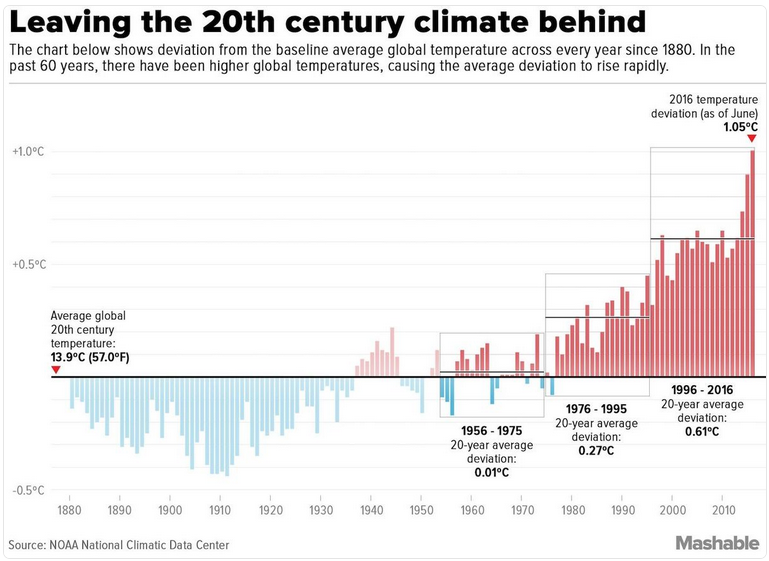 We agree with pioneering climate-scientist
We agree with pioneering climate-scientist 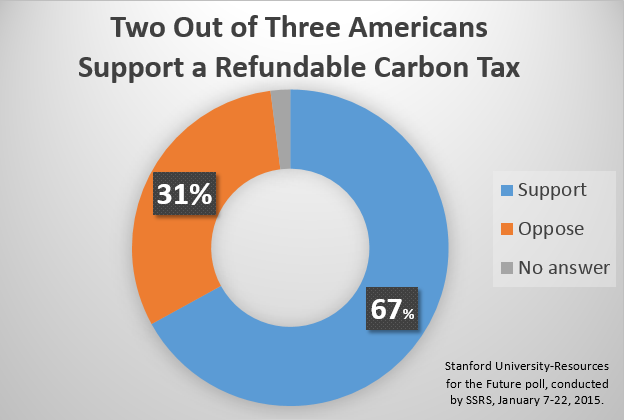
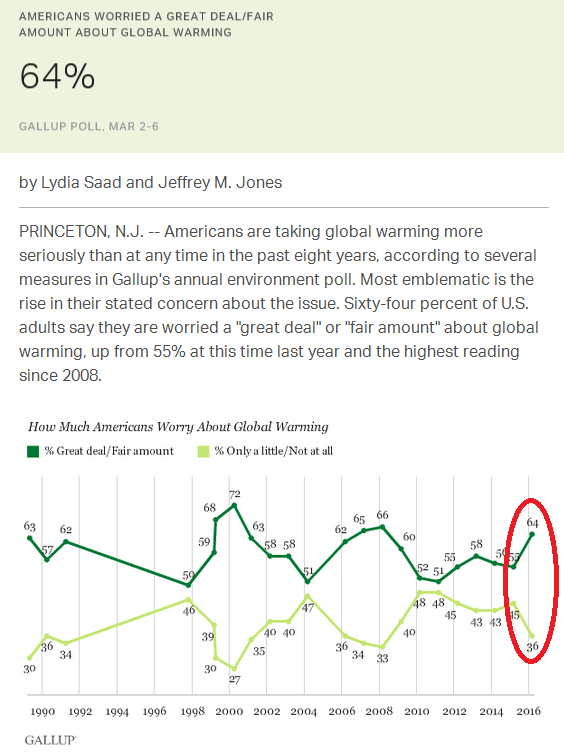 Other results from the 2016 Gallup poll are equally striking. They show a record-high share of Americans stating that climate change poses a threat to them and their way of life; a record number agreeing that climate change is caused primarily by human activity; and climate concern climbing across the political spectrum.
Other results from the 2016 Gallup poll are equally striking. They show a record-high share of Americans stating that climate change poses a threat to them and their way of life; a record number agreeing that climate change is caused primarily by human activity; and climate concern climbing across the political spectrum.